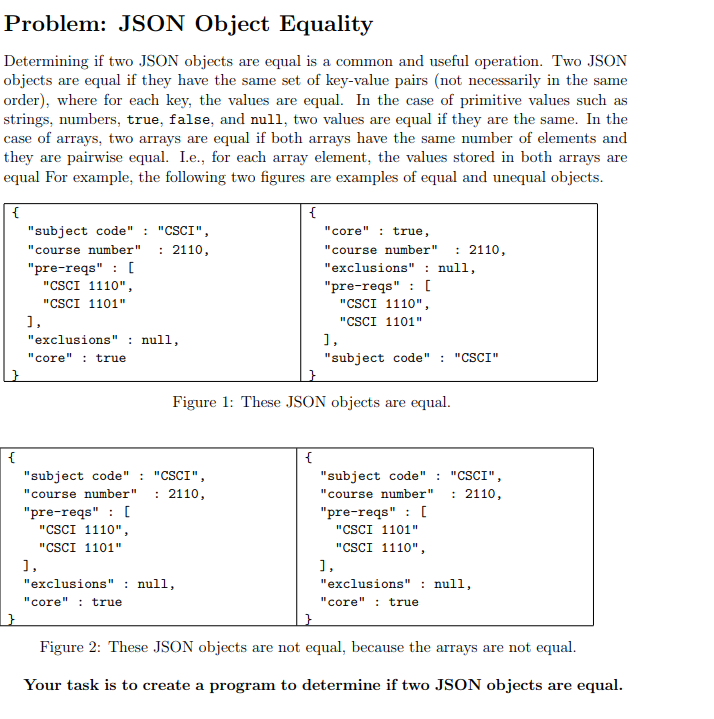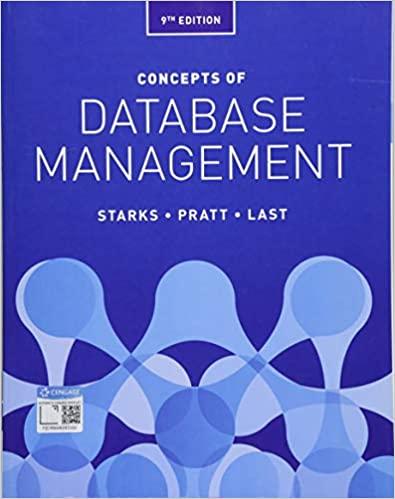Question
Create a Java program that compares if two JSON Objects are equal. You must use the sample code and implement least one of the following
Create a Java program that compares if two JSON Objects are equal. You must use the sample code and implement least one of the following: method(s) with recursion, lists, stack. A sample code is provided for assistance.
Sample Code:
/* * This is a simple ccanner that breaks up the text into JSON tokens. * The scanner provides teo constructors and two methods: * JSONScanner( String s ) : takes a String and creates a stream of tokens * JSONScanner( InputStream is ) : takes an InputStream object, such as * System.in and creates a stream of tokens * String next() : returns next token in the stream * String hasNext() : returns true if another token is available */
import java.util.Arrays; import java.util.Scanner; import java.io.InputStream;
public class test { final static char [] singletons = { '{', '}', '[', ']', ',', ':' };
static { Arrays.sort(singletons); }
private char [] obj; // character array containing the JSON object private int idx = 0; // current index
/* This constructor takes a String, whose contents is to be tokenized. * Param: s : String, the contents of which is to be tokenized */ public JSONScanner( String s ) { obj = s.toCharArray(); }
/* This constructor takes a InputStream object (such as System.in, whose * contents is to be tokenized. * Param: s : InputStream, the contents of which is to be tokenized */ public JSONScanner( InputStream in ) { Scanner sin = new Scanner(in); String s = ""; while (sin.hasNextLine()) { s = s + sin.nextLine(); } obj = s.toCharArray(); }
/* Returns the next JSON token in the stream. * Returns: String: the next token or exits if no more tokens are available */ public String next() { for (; idx = 0) { idx++; return "" + obj[idx - 1]; } else if ((obj[idx] == '-') || Character.isDigit(obj[idx])) { return getNumber(); } else if (obj[idx] == '"') { return getString(); } else if (Character.isLetter(obj[idx])) { return getLiteral(); } else if (!Character.isWhitespace(obj[idx])) { System.err.println("Unexpected input: " + obj[idx]); System.exit(1); } } System.err.println("Unexpected end of input"); System.exit(1); return null; } /* Returns true if there is a next JSON token in the stream. * Returns: boolean */ public boolean hasNext() { for (; idx
for (; idx
if (obj[idx] == '') { idx++; str += obj[idx]; } else if (obj[idx] == '"') { idx++; return str; } } System.err.println("Unexpected end of input"); System.exit(1); return null; }
/* Returns the JSON literal in (null, true, false) * Returns: String: the JSON literal */ private String getLiteral() { String str = ""; while (Character.isLetter(obj[idx])) { str += obj[idx]; idx++; } switch (str) { case "null": case "true": case "false": break; default: System.err.println("Unexpected input: " + str); System.exit(1); } return str; } }

Step by Step Solution
There are 3 Steps involved in it
Step: 1

Get Instant Access to Expert-Tailored Solutions
See step-by-step solutions with expert insights and AI powered tools for academic success
Step: 2

Step: 3

Ace Your Homework with AI
Get the answers you need in no time with our AI-driven, step-by-step assistance
Get Started


